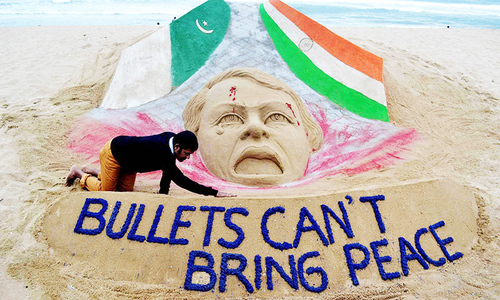KARACHI: Eyes averted, 18 Pakistani fishermen recently released from Indian prisons hurried along in quick stride making it difficult to catch up with them. Though they had arrived here via a train from Lahore on Friday afternoon, their expressions belied the feeling that they were now safe on Pakistani territory.
As scores of people milled onto Cantonment Railway Station’s Platform 8 eager to meet the released fishermen, little did they know that the 18 men only wanted to go to their homes in Sujawal district.
They managed to avoid almost everyone, although a politician and his men at the station did grab one or two by their arms to pose with them for pictures.
Among them were three minors. Young Saddam, holding on tightly to a relative’s hand, shook his head at the questions directed at him. “Please leave him alone,” said his relative, “He seems to have lost his mental balance.”
Abbas, 12, also a fisherman, was asked if he had been sent to a juvenile facility and he replied in negative. “I was in the same jail as the other men. I was as badly beaten as them and I ate the same stale food with dried bread that they were given,” he said, before quickly elbowing his way through the crowd. He was angry and was not interested in speaking to anyone other than his relatives present at the train station.
“We got caught from our fishing boat ‘Mashallah 18593-B’ while we were fishing in broad daylight near Thatta on May 12, 2016,” said Khan Mohammad. “We are not clear as to whether we really did violate Indian waters or if they came to our side to drag us to theirs and arrest us,” he said. “We got many beatings during interrogation. They wanted to know whether we were sent by Pakistan and if we were carrying weapons in our boat. We only had one answer to give to them, that we were poor fishermen who had lost their way while catching fish,” he added.
Sikander, another young fisherman, said many of them had been kept in solitary confinement the whole time. “We were treated like the most dangerous prisoners because we were Pakistanis,” he said.
“I felt that the jail authorities in Gujarat were meaner to us Sindhis. They beat us all the time and gave us nothing but rotten leftovers to eat,” said Moosa, another young fisherman, who returned here on Friday.
Qasim, another fisherman, said that he was released with two of his brothers, Moosa and Khuda Baksh. “But I still have nine cousins languishing in Indian jails. It makes me feel guilty for getting released,” he said.
Bachal Thebo, their father, said that he found out that his boys were being released by India only two days ago. “At first I thought that I might have heard wrong because most fishermen in Indian jails are not released so soon. But I had to come here myself to see if it really was them, and here we are,” he said, hugging his eldest son Qasim.
“I am an old man and with my sons in an Indian jail, the responsibility of feeding my family fell on me. Sometimes I would find work as a labourer, sometimes I would get a loan but many times the family had to go to bed on an empty stomach,” he shared.
The rest of the returning men are Ghulam Rasool, Amin, Mohammad Anwer, Bashir, Yaseen, Gul Mohammad, Yar Mohammad, Mohammad Ismail, Khan Mohammad, Qadir Bakhsh, Khairu and Sulaiman.
Mohammad Ali Shah, chairman of the Pakistan Fisherfolk Forum, who had also come to receive the fishermen at the station, said it was good that they had returned home in less than a year. In December and January, the Pakistani government had released over 400 Indian fishermen whereas India has released only 18, he added.
“They catch many but release only a handful,” he said, adding that there were some 85 Pakistani fishermen who have been languishing in Indian jails for several years and should also be freed.
“Four among them have been there for 17 years now,” said Mr Shah, while also bringing up the matter of Rasheed, a young Pakistani fisherman jailed in India despite having served his entire sentence. “He cannot come back here because our government has not confirmed his nationality,” he said.
Mr Shah reminded that both India and Pakistan had been arresting fishermen since 1965. However, Article 73 of the United Nations on the Law of the Sea says that no fisherman can be arrested and sent to prison like this for unknowingly drifting into another’s territory. “So both India and Pakistan have been violating this law. They should find a permanent solution to this problem rather than arresting them and throwing them in prison,” he said.
Sindh’s Minister for Fisheries and Livestock, Mohammad Ali Malkani, was also present on the occasion.
Published in Dawn, March 4th, 2017














































